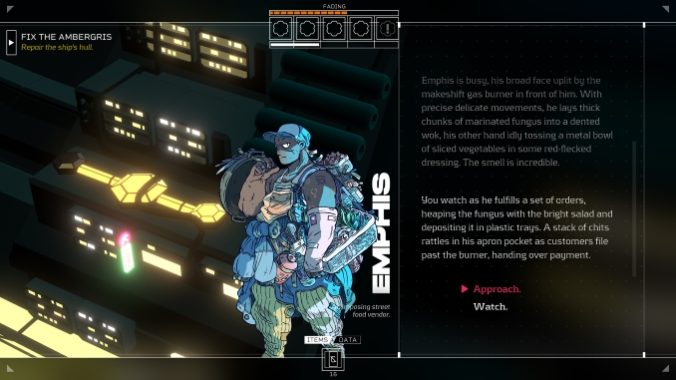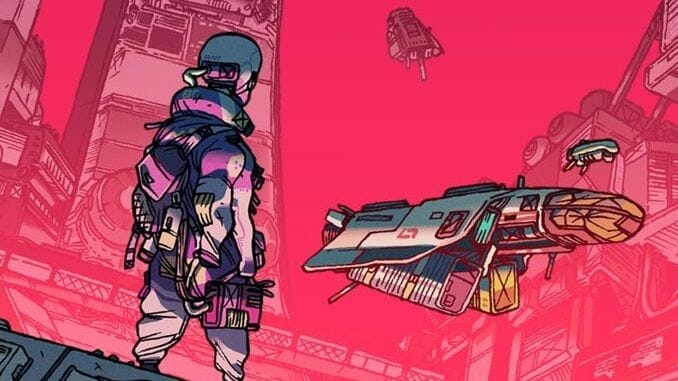It’s the end of 2023 so I’ve, quite naturally, been reflecting on the year that’s passed and what I’ve played. Citizen Sleeper‘s the first game I finished this year and it’s been hard to stop thinking about it. You see, Citizen Sleeper bears a sort of tagline that’s been running through my head since I first heard it: “Roleplaying in the ruins of interplanetary capitalism.” It’s a compelling thought experiment when you feel that interplanetary capitalism, or more explicitly its ruins, are in a far-flung future, one you may never even reach. How do you carve out a life and purpose when the systems that purport to support it, and all you’ve ever known, completely fall apart? Naturally, I’ve thought a lot about this because I’m an anxious 26-year old, but also because I’m a Twitter (or I guess X) user in 2023.
In the fall of 2022, Elon Musk took over Twitter, purportedly on some campaign to curb the scourge of bots on the website. In his much-publicized tenure, the site has all but fallen into disrepair numerous times, largely thanks to the cut in the workforce Musk immediately introduced upon taking up the helm. The content moderation team doesn’t exist anymore, any leadership that could’ve challenged or guided Musk is out, and features of the site have been repealed or, worse, hidden behind the now-garish blue check that he expects folks to pay for. Yep, the mind that brought you Boring Company and a useless fucking tunnel under California has also given us X. Praise be.
Numerous last minute—not to mention, anti-consumer—reforms and policy changes, like eliminating headlines from thumbnails and expecting new users to pay for the site and app, have inspired countless waves of exodus from the once beloved site. Now people are setting up shop elsewhere, whether it be Meta’s Threads, Bluesky, Cohost, Hive, or whatever other alternative has sprung up over the last year of this exhausting period. Maybe they’re like myself and have accounts on all these sites and more but are largely lethargic about the notion of posting anywhere anymore. Maybe they’re scattered to the winds, having secured the friends and connections they needed and fucking off out of the miasmic web that is social media. Regardless, an era is ending, and the anxiety of packing up and doing this anywhere else is very very real. But such is life in the ruins of capitalism.
Citizen Sleeper drops you into the end days of the eponymous Sleeper, a corporate-owned and manufactured body with the consciousness of an actual person in it. When you wind up on the Eye, having escaped indentured servitude elsewhere in the system, it’s your first chance at an existence of your own creation. You’re injected into this already existing ecosystem built more or less on the refuse of what came before it and meet the folks making the best of it. You find Ethan, a bounty hunter who’s come to collect the price on your head, but you also meet Tala and Emphis who run shops on the Eye and offer you warmth, both literally and metaphorically.
You encounter Lem and Mina too. Lem, a father trying to support his young daughter while slaving away at a shipyard, is illustrative of the common man and how the systems in place aren’t conducive to a good life for a person like that. He’s spread too thin by work, appearing gaunt in his portrait art. On occasion he welcomes your help with Mina, when he needs to pull an especially long and trying shift. He’s always so tired, the bags under his eyes carrying the weight of years of labors of love for his small family. He and Mina are the heart of Citizen Sleeper, perhaps even its central thesis. They’re one of the earliest interactions you can chance upon in your time on the Eye, and I’m sure for many players, their ending is the most emotionally substantive and fulfilling. It’s also one of the easiest to complete; in short, kindness, love, and acceptance aren’t that hard to come across in systems that prioritize everything but.

To sum up 11 years on Twitter, it has invariably changed my life. Over the years, I enmeshed myself with communities with whom I shared values and interests and started mouthing off about games. I made a blog, joined another and made friends. I even became a bit of a popular name in those circles. It was wild to go to events and meet people who wanted to meet me. Not because I’d become famous, but just because they knew who I was and liked me. It feels silly to admit here, for the internet and God to see, but I felt wanted. I’ve met some of the most important people in my life through that stupid fucking website. People who I get to see and hug as tightly as I can when I see them while traveling the world for work.
Speaking of, I’m indebted to the site for being able to do this and call it a job. I owe it for my colleagues, with whom I occasionally gather and bitch about work, a luxury I never had in other workplaces and fields where I felt like a stranger.
I also owe it my occasional estrangement and bouts of depression. Where it once made me feel better, life on social media now flares up insecurities about my importance to people. If my Twitter Circle (RIP) could go on without me, did I matter that much? While I’ve been largely gifted in my time on Twitter, it’s caused strife; people on it have brigaded against me and friends for standing by one another and for causes we closely aligned with. Since 2016, the site has seemed at times overwhelmingly filled with people champing at the bit to tell you how much they wish you were dead. I think it’s great to be informed, but the steady stream of catastrophes casually trotted out on the timeline have demoralized me over the years. I should feel closer to the world I know so much about, and yet I feel so detached and distant from it and the nonstop tragedies that plague it. There’s little wonder and magic staring at the world through the lens of what and who comes into our digital town square anymore. And yet despite that, it’s hard to argue that it didn’t work at one point in time.
The Eye is a lot like a digital town square. I mostly know the people on it as avatar-like portraits (exceptionally illustrated by Guillaume Singelin) and the intimate conversations we have. People come and go on it, like Ethan, the bounty hunter who comes after you and eventually fades into obscurity as he fights his own battles with debt and substance abuse on the Eye. I know, or knew, a few Ethans. I also know unbelievable fonts of light like Mina and Tala, who gives you a job at her bar and is one of the few characters to openly embrace you right off the bat. I know working-class people like Lem and folks with sordid history like Ankhita. The point of the Eye, as much as it is true of what Twitter once was, is that there are a great deal of people it can support and play host to. The wealth of living is the great scores of people you can meet. The exuberant type, the hardworking type, the shady backstabbing type—every type, really. Not every connection I’ve made in my own life has been clean-cut and proper, and yet I’m grateful for the life I’ve lived, the people who’ve played a part in it and molded me, as well as the stories I’ve been able to walk away with. I look forward to doing it for as long as I can.
The Eye is also a tool. It’s a springboard to other places, as evidenced by your own Sleeper’s journey to get off of it. It could be home, but it isn’t necessarily built to be it. It’s impermanent, a half-step in your journey rather than the destination at the end of it. It’s a place people meet to exchange goods and services. It’s a place to get a job and fake it till you make it. It’s a framework to fashion something else for your life. I can’t think of a better series of statements to better sum up Twitter, which was never the endgame, even if it began feeling like it. When I came to Twitter, it was for the jokes. It’s the people that’ve kept me there for longer than I could’ve ever imagined. I would stay on the site forever if it meant holding onto what I’ve built there, but on the other side of 11 years of it, maybe I’ve done everything I needed to do there. Maybe it’s time I let go, and be content with what I have, which if you ask me, is beyond measure. Maybe it’s time I leave the Eye.
The Eye, and likewise Twitter, is beyond my control. Forces much more powerful than me dictate either’s operability. They determine how likely it is that I stay or leave these digital town squares. But whereas my Sleeper elected to stay on the Eye to either forge a life there or find some better way out, I feel I’m being forced out of Twitter. I guess that’s the important distinction between fantasy and real life: you can’t always have it exactly the way you want in real life. And so I’ve got to learn how to get by without it. How to not treat it like such a crutch, so that when the inevitable parting of ways happens, I’m not too unprepared to treat the wound.
Citizen Sleeper, more than anything else, is a game about forging connections at improbable times and against all odds. Capitalism can gut the system as much as it wants, but it’ll never quite snuff out the spirit of the people it bleeds dry. It’s a truth I’ve lived every day, and one I intend to carry on long after Twitter has come and gone. And so I bid it adieu, and thank it for the grit it gave me and the connections that I hope last a lifetime. And even if they don’t, I thank it for proving out that no matter where we go, I’ll always find my people.
Moises Taveras is the assistant games editor for Paste Magazine. He was that one kid who was really excited about Google+ and is still sad about how that turned out.

